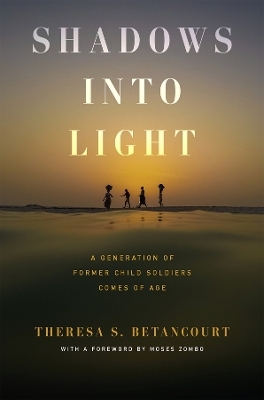
Shadows into Light
A Generation of Former Child Soldiers Comes of Age
Seiten
2025
Harvard University Press (Verlag)
978-0-674-25105-2 (ISBN)
Harvard University Press (Verlag)
978-0-674-25105-2 (ISBN)
- Noch nicht erschienen (ca. Januar 2025)
- Versandkostenfrei innerhalb Deutschlands
- Auch auf Rechnung
- Verfügbarkeit in der Filiale vor Ort prüfen
- Artikel merken
For over two decades, Theresa S. Betancourt researched former child soldiers from Sierra Leone’s civil war to find out if they could reintegrate into communities where they had been forced to commit atrocities. She found that the key to resilience after trauma was not just their individual capacities, but the layers of support and care around them.
A twenty-plus-year study of former child soldiers offers far-reaching insight into mental health and resilience after extreme trauma.
During the civil war that ravaged Sierra Leone from 1991 to 2002, an estimated 20,000 children were forced to join the fighting. As villages were raided and youths rounded up, it was not uncommon for a child to be ordered to kill a friend, relative, or neighbor under threat of being killed themselves. The goal was to make it impossible for the captives to return home and be accepted back into their communities.
But when the conflict ended, many of the children did find their way home. Could they reintegrate after such extreme trauma? Theresa Betancourt and her collaborators in Sierra Leone launched a study of more than 500 boys and girls who had been pulled into the war, tracking them for over two decades. The results were surprising: despite everything they had suffered, this was not a lost generation. In fact, the most dominant trend over time was one of healing and increasing acceptance. The lives of the former child soldiers were shaped not just by their personal ordeals but also, crucially, by the responses of their families, peers, and broader communities. Filled with vivid personal stories, Shadows into Light describes heartbreak and despair but also remarkable triumphs made possible by layers of social support and encouragement.
Betancourt’s study provides unparalleled insight into the long-term psychological and developmental effects of family separation, war, and exposure to violence. The lessons go far beyond Sierra Leone’s tragedy, suggesting that we should, in general, think of children’s risk and resilience more as products of the post-trauma environment than as individual traits.
A twenty-plus-year study of former child soldiers offers far-reaching insight into mental health and resilience after extreme trauma.
During the civil war that ravaged Sierra Leone from 1991 to 2002, an estimated 20,000 children were forced to join the fighting. As villages were raided and youths rounded up, it was not uncommon for a child to be ordered to kill a friend, relative, or neighbor under threat of being killed themselves. The goal was to make it impossible for the captives to return home and be accepted back into their communities.
But when the conflict ended, many of the children did find their way home. Could they reintegrate after such extreme trauma? Theresa Betancourt and her collaborators in Sierra Leone launched a study of more than 500 boys and girls who had been pulled into the war, tracking them for over two decades. The results were surprising: despite everything they had suffered, this was not a lost generation. In fact, the most dominant trend over time was one of healing and increasing acceptance. The lives of the former child soldiers were shaped not just by their personal ordeals but also, crucially, by the responses of their families, peers, and broader communities. Filled with vivid personal stories, Shadows into Light describes heartbreak and despair but also remarkable triumphs made possible by layers of social support and encouragement.
Betancourt’s study provides unparalleled insight into the long-term psychological and developmental effects of family separation, war, and exposure to violence. The lessons go far beyond Sierra Leone’s tragedy, suggesting that we should, in general, think of children’s risk and resilience more as products of the post-trauma environment than as individual traits.
Theresa S. Betancourt is the inaugural Salem Professor in Global Practice at the Boston College School of Social Work and Director of the Research Program on Children and Adversity. She has been an advisor for UNICEF, the International Rescue Committee, Amnesty International, the US Institute of Peace, and the World Health Organization, and served as an expert of the International Criminal Court.
| Erscheint lt. Verlag | 21.1.2025 |
|---|---|
| Vorwort | Moses Zombo |
| Verlagsort | Cambridge, Mass |
| Sprache | englisch |
| Maße | 140 x 210 mm |
| Gewicht | 514 g |
| Themenwelt | Geisteswissenschaften ► Psychologie ► Entwicklungspsychologie |
| Medizin / Pharmazie ► Medizinische Fachgebiete ► Psychiatrie / Psychotherapie | |
| Sozialwissenschaften ► Soziologie | |
| ISBN-10 | 0-674-25105-9 / 0674251059 |
| ISBN-13 | 978-0-674-25105-2 / 9780674251052 |
| Zustand | Neuware |
| Haben Sie eine Frage zum Produkt? |
Mehr entdecken
aus dem Bereich
aus dem Bereich
Vormals Oerter & Montada
Buch | Hardcover (2018)
Julius Beltz GmbH & Co. KG (Verlag)
64,00 €
Grundlagen, Diagnostik und Therapie vom Säuglingsalter bis zum alten …
Buch | Hardcover (2022)
Klett-Cotta (Verlag)
45,00 €
Deutsche Auflage unter Mitarbeit von Sabina Pauen
Buch (2022)
Springer (Verlag)
59,98 €


